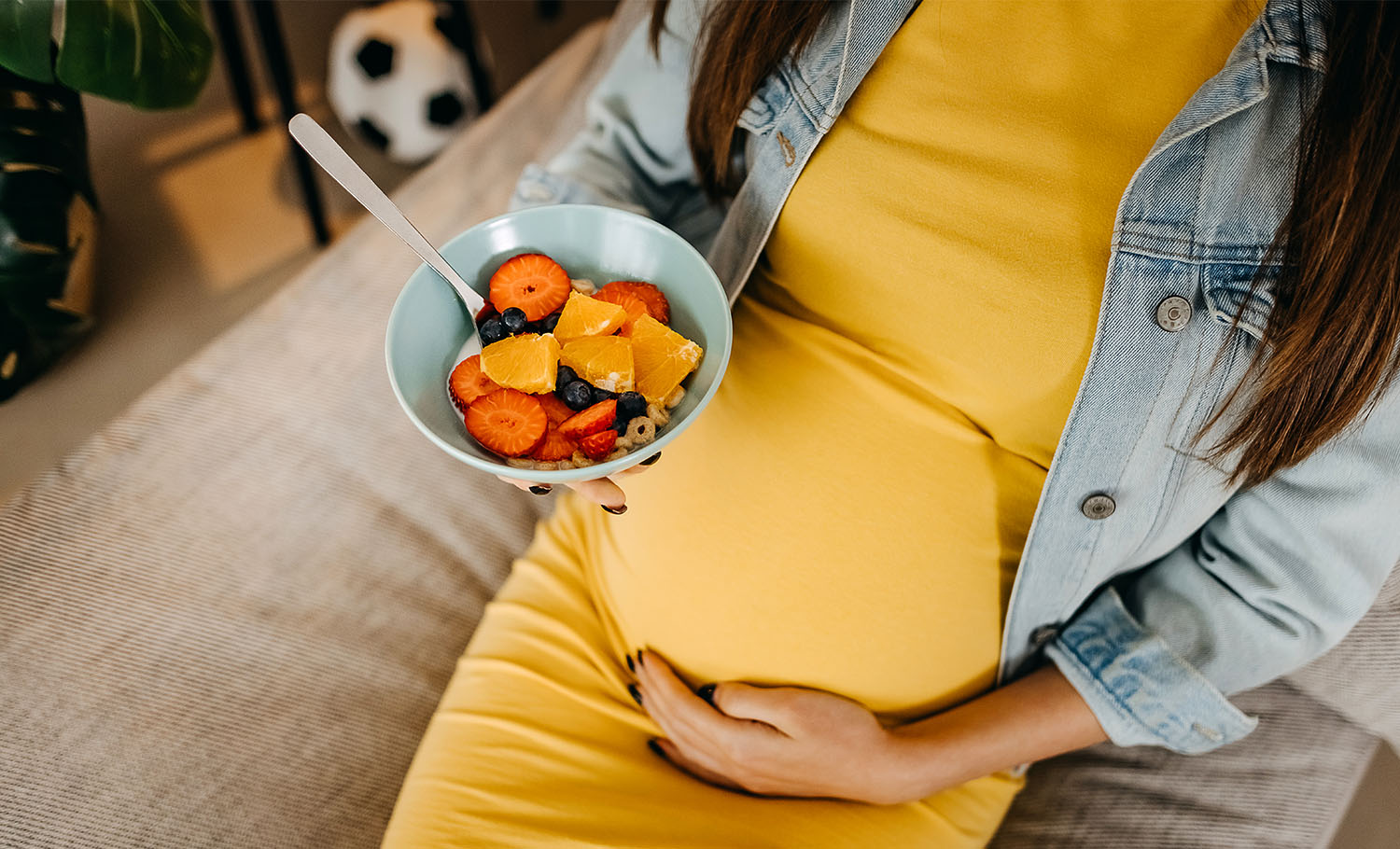Everything you need to know about pregnancy and birth
03 April 2025 | Comment(s) |
Livia Zimmermann

There are still many taboos, myths and myths surrounding pregnancy and childbirth. How can I prepare for childbirth? Can I continue jogging? How will I feel after the birth? We put all these questions and more to Dr Jarmila A. Zdanowicz, a specialist in gynaecology and obstetrics and Head of Clinic and Senior Physician at the Maternity Dept. of the Inselspital in Bern.
Groupe Mutuel: Come può una donna sapere se è incinta?

Jarmila A. Zdanowicz: There are probable and uncertain signs of pregnancy. The uncertain signs include nausea and vomiting, pronounced fatigue, tightness in the lower abdomen and tension in the breasts. Some women also notice an increase in vaginal discharge, which differs from that before menstruation. However, pregnancy can only be officially proven and confirmed by a blood or urine test. In addition, during the first examination, an ultrasound scan of the uterus is performed to detect the presence of an embryo with a heartbeat.
What don’t they tell you about pregnancy and childbirth?
In fact, nothing should be left unsaid. But it's sometimes difficult to find a compromise between giving women sufficient information and giving them too much, especially when it comes to possible complications during pregnancy or childbirth. I don't wish to go through all the possibilities that could arise, because women need to enjoy their pregnancy and not experience it in a state of permanent anxiety.
However, I think some subjects aren't talked about enough, such as breastfeeding. If breastfeeding doesn't work out as planned, many women suffer from this “failure” and put pressure on themselves. I would like to stress that this does not mean that the child lacks care or that the woman becomes or is a bad mother.
Bladder problems or incontinence are another taboo subject. Women may experience urine leakage after giving birth. This eventually passes, but it can also persist. That's why pelvic floor re-education is so important during pregnancy. There are also specialists in urogynaecology who deal with this problem.
A false image is also conveyed by celebrities who show off how they have regained a beautiful body in just three months. A woman's body takes 10 months to give birth to a child, so it needs time to regenerate.
We don't talk much about pain either. You can't imagine contractions until you've experienced them, and everyone feels pain differently. That's why the decision whether to have an epidural should be left to each woman. It is interesting to note that more women in French-speaking Switzerland have recourse to an epidural than in German-speaking Switzerland.
"The important thing about pregnancy and childbirth is that there is no norm. There is no right or wrong thing to do".
In fact, nothing should be left unsaid. But it's sometimes difficult to find a compromise between giving women sufficient information and giving them too much, especially when it comes to possible complications during pregnancy or childbirth. I don't wish to go through all the possibilities that could arise, because women need to enjoy their pregnancy and not experience it in a state of permanent anxiety.
However, I think some subjects aren't talked about enough, such as breastfeeding. If breastfeeding doesn't work out as planned, many women suffer from this “failure” and put pressure on themselves. I would like to stress that this does not mean that the child lacks care or that the woman becomes or is a bad mother.
Bladder problems or incontinence are another taboo subject. Women may experience urine leakage after giving birth. This eventually passes, but it can also persist. That's why pelvic floor re-education is so important during pregnancy. There are also specialists in urogynaecology who deal with this problem.
A false image is also conveyed by celebrities who show off how they have regained a beautiful body in just three months. A woman's body takes 10 months to give birth to a child, so it needs time to regenerate.
We don't talk much about pain either. You can't imagine contractions until you've experienced them, and everyone feels pain differently. That's why the decision whether to have an epidural should be left to each woman. It is interesting to note that more women in French-speaking Switzerland have recourse to an epidural than in German-speaking Switzerland.

How can women prepare for childbirth?
There are childbirth preparation courses , which you can take with your partner from around the 28th week of pregnancy. You get to discuss childbirth, what exactly is happening, how to deal with the pain, and you can learn breathing techniques, etc. There are also individual childbirth preparation courses, which you take with the midwife who is already treating you during your pregnancy.
I think it's a good idea to take a course like this. Particularly for a first child, it provides valuable information and explains how childbirth works. When should I go to hospital if I'm having contractions? What relaxation techniques and pain relief options are available? We also learn, for example, that during childbirth, blood, fluid and feces appear when you push, and that this is completely normal.
What should I avoid during pregnancy?
The most important things to avoid are alcohol and tobacco and, of course, all kinds of drugs. You also have to watch out for caffeine even though one or two coffees a day is “the lesser evil”.
You also need to ensure good hygiene at mealtimes, washing your hands before eating and washing vegetables well too. Don't eat raw meat or fish; everything should be thoroughly cooked. You should also be careful with cheese and avoid soft cheeses in particular.
Care should also be taken when carrying and lifting heavy loads. The bigger the belly or the more advanced the pregnancy, the less weight a woman should carry and lift.
I used to jog regularly. Should I stop? What sports can I still do?
No, in fact, any type of exercise is good during pregnancy. However, during pregnancy, the ligaments are much more elastic and you have to be careful, because you can have a sprain more easily and injure yourself. Later on, when the belly becomes rounder, you also need to be careful, of course, as this puts a strain on the pelvic floor.
Finally, it's not necessarily the right time to take up new sports.
The best sport is swimming, but there are exceptions to this rule. However, in the case of an uncomplicated pregnancy, swimming is an appropriate workout for the whole body.
Otherwise, you should avoid sports where you could potentially fall on your stomach. But I think it’s just a case for common sense: women will realize what they can and can't do when they're pregnant.

What causes the increased need to urinate at the end of pregnancy?
On the one hand, the belly becomes rounder, the uterus grows and all this puts pressure on the bladder. On the other hand, this urge to urinate is also due to hormonal factors. Women have more progesterone in their bodies, which also has an effect on the bladder muscles and relaxes them. Pregnant women also have increased blood circulation. The kidneys are better irrigated, which leads to greater urine production.
Should every woman wear compression stockings during pregnancy?
No, not necessarily. It depends on whether she has to stand a lot and what ailments she suffers from. I recommend compression stockings in cases of fluid retention, circulation problems, long journeys or if the woman has to stand a lot at work.
How can I express my wishes during childbirth?
Childbirth is a collaboration between the woman, the midwives and, if necessary, the doctors. The aim is for the woman to have a good experience with few complications and for the baby to be born healthy. We always try to take the woman's wishes into account as much as possible. But it may happen, for example, that we unexpectedly have to perform a caesarean section or what is known as a vacuum delivery.
All childbirth is unpredictable and women need to be prepared for the fact that things may not go as planned. The best thing is to think about it in advance and discuss it with your partner.
Whenever a woman feels uncomfortable or doesn't understand something, she should ask questions.
"Advice is generally well-intentioned, but can be destabilising".
What is important after birth?
When everything has gone well, the most important thing is to be happy and proud. We've done something incredible in the last ten months and for me, it's always a wonderful miracle every time a child is born!
Whatever the outcome of your pregnancy, you need to take your time because you're tired, you're exhausted and you need to rest. And you can also leave the baby for a few hours so that you can get some sleep yourself - without a guilty conscience. You have to take the time to come to your senses. Give yourself that time!
What can I expect when it comes to menstruation after the birth of a child?

In general, menstruation is different after childbirth and a little heavier the first few times. Normally, menstruation returns six to eight weeks after giving birth.
However, many women do not yet menstruate when they are breastfeeding. But not everyone does. The important thing is that, even while breastfeeding, you need to be careful about contraception, because you can still get pregnant. In general, you want to give your body time to recover. In the case of a normal delivery, you generally have to wait six months, or a year in the case of a caesarean section, before becoming pregnant again.
"A lot of women are locked into preconceived ideas, which sometimes don't correspond to reality".
How do you recognise post-partum depression?
It's important to distinguish between baby blues and depression.
For the first few days, many women suffer from “baby blues". However, this condition normally disappears after one or two weeks at the most. In general, women then become emotional, with frequent mood swings, crying and impatience. This is due to the hormonal changes that the body has to get used to.
Around 15% of women suffer from post-partum depression . This can last for weeks or months. They suffer from insomnia and exhaustion, have no energy or appetite, and gain or lose a lot of weight. You worry all the time, feel despair and sadness, and have strange thoughts about yourself and your child. These are warning signs and it is absolutely essential to seek help.
Fathers can also suffer from post-partum depression. Many don't sleep well either, worry about everything and perhaps also feel the pressure of being the sole carer for the family.
Many women feel they have failed after a caesarean section. What do you tell them?
There's a lot of unnecessary guilt attached to women. Sometimes we are given the impression, from the outside, that we must give birth vaginally at all costs. But this is not true.
Sometimes there is a medical reason for a C-section. Generally speaking, the rate of caesarean births is on the increase. This is linked to a number of factors: there are more older women with a medical history who become pregnant, or women who have already undergone uterine surgery and therefore need to have a caesarean section. There are also women who already know, when they become pregnant, that they want to have a caesarean section. It all depends on the individual.
What's the most beautiful birth you've ever witnessed?
The birth of my own children, of course! I gave birth where I work, because I knew I'd be in the best hands. Unfortunately, I also experienced complications. However, I regard them as an experience and I can now say that I know what it feels like to be on the “other side”.





